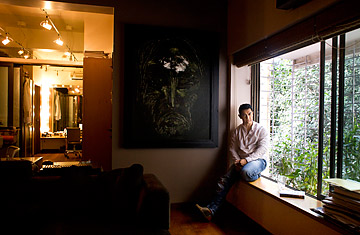
Portrait of Aamir Khan at his residence in Pali Hills, Mumbai, June 8, 2012
Indians of my generation can pinpoint the precise moment that Aamir Khan became a movie star. It's the scene in the 1988 blockbuster hit Qayamat Se Qayamat Tak (From Resurrection to Resurrection) when Khan's character, Raj, in a bouffant hairdo, skinny black tie and open waistcoat, straps on an electric guitar and launches into his first song: "Papa kehte hain bada naam karegaa" (Dad says I'm going to make a name for myself, but nobody knows where I'm going). The lyrics, the look and the attitude captured both the aplomb and anxiety of youth, and the fun-loving, fresh-faced actor who embodied those qualities became an instant favorite of millions.
The Aamir Khan sitting across from me in the office of his elegant, art-filled apartment in Mumbai's tony Pali Hill is nothing at all like Raj: he's all grown up and very, very serious. His legs are folded in the lotus position on his favorite perch, a faded green armchair. His palms are joined as if in prayer, with both forefingers grazing his lower lip. His back is perfectly straight. It is the ideal posture to meditate on the question he has himself raised: "What is the role of the entertainer?" After waiting just long enough to make me think I'm required to respond, he supplies his own answer: "It's to bring grace to society, to affect the way people think, to make the social fabric stronger."
That would be grandiose coming from almost any movie star, but 47-year-old Khan, one of India's most successful actors, is trying very hard to live up to his ideal. Over the past decade he has acted in, directed and produced a string of movies that artfully straddle the demands of popular cinema and that desire for grace. Now, with his groundbreaking TV show Satyamev Jayate (Truth Alone Prevails), he has dispensed with commercial considerations to indulge his conscience. With it, Khan has taken on the mantle of the country's first superstar-activist.
The show, in equal parts chat and journalism, casts an unblinking spotlight on some of India's ugliest social problems. Khan is its creator, producer and host, and he has invested it with his star power — and his credibility. It's a ballsy move, and potentially jeopardizes his status as the beloved idol of millions. After all, the subjects his show tackles — whether female feticide and the sexual abuse of children or honor killings and the terrible inequities of the caste system — are precisely the sorts of harsh realities from which many of Khan's fans seek escape in his movies. "He's betting that people who come to him for entertainment will also follow him on more serious issues," says Rajkumar Hirani, who directed Khan in the 2009 blockbuster hit, 3 Idiots, the highest-grossing Indian movie ever. "That's a risk few actors will take."
It might just pay off — for India as much as for Khan. By the time the 13th and final episode of the show's first season aired on July 29, it had notched up an aggregate TV audience in excess of 500 million. (A special 14th episode was broadcast on Aug. 15, the anniversary of India's independence.) Many more millions followed the series on radio, watched episodes online or picked up threads of the discussion in their newspapers. It may be impossible to calculate how much total benefit Khan has brought to Indian society, but there's plenty of anecdotal evidence that the actor long typecast as a singing-and-dancing romantic lead is enabling some real change.
Only days after an episode on the sexual abuse of children, the lower house of India's Parliament passed a long-overdue bill to protect kids from such molestation. Another segment, on the exploitation of "low caste" Indians, led to a meeting and discussion with Prime Minister Manmohan Singh. A show about crooked doctors brought an invitation to testify before a parliamentary committee, a first for an actor. It's not only the high and mighty who are reacting to Khan's high-wattage advocacy. After the episode on female feticide, the chief of Budania, a small village in Rajasthan state, vowed to set the police on families that sought gender-determination tests and abortions.
Not all the response has been positive. A doctors' association demanded that Khan apologize for the episode on medical malpractice, saying it unfairly portrays all doctors as greedy and crooked. (Khan denied that all doctors were so portrayed and refused to apologize.) Some commentators have carped that the star's prescriptions for the social ills he identifies are too woolly minded and impractical. (Sounding frequently like a self-help guru, Khan indicates that India's problems could be solved if all Indians resolved to solve them.) Others suggest that the actor fakes the emotions he displays during the show's more dramatic moments. Aveek Sen wrote in Kolkata's Telegraph newspaper: "[Khan's] empathy is endless and humility endless — and both instantly, endlessly, enacted."
